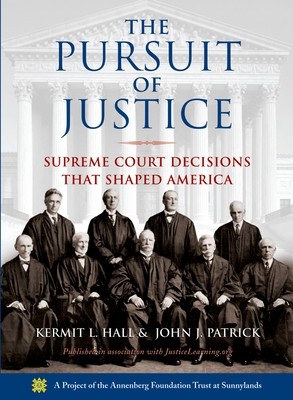
- We will send in 10–14 business days.
- Author: Kermit L Hall
- Publisher: Oxford University Press, USA
- ISBN-10: 0195311892
- ISBN-13: 9780195311891
- Format: 22.1 x 28.5 x 2.1 cm, hardcover
- Language: English
- SAVE -10% with code: EXTRA
Reviews
Description
With a survey of the thirty Supreme Court cases that, in the opinion of U.S. Supreme Court justices and leading civics educators and legal historians, are the most important for American citizens to understand, The Pursuit of Justice is the perfect companion for those wishing to learn more about American civics and government. The cases range across three centuries of American history, including such landmarks as Marbury v. Madison (1803), which established the principle of judicial review; Scott v. Sandford (1857), which inflamed the slavery argument in the United States and led to the Civil War; Plessy v. Ferguson (1896), which memorialized the concept of separate but equal; and Brown v. Board of Education (1954), which overturned Plessy. Dealing with issues of particular concern to students, such as voting, school prayer, search and seizure, and affirmative action, and broad democratic concepts such as separation of powers, federalism, and separation of church and state, the
book covers all the major cases specified in the national and state civics and American history standards.
EXTRA 10 % discount with code: EXTRA
The promotion ends in 16d.22:25:23
The discount code is valid when purchasing from 10 €. Discounts do not stack.
- Author: Kermit L Hall
- Publisher: Oxford University Press, USA
- ISBN-10: 0195311892
- ISBN-13: 9780195311891
- Format: 22.1 x 28.5 x 2.1 cm, hardcover
- Language: English English
With a survey of the thirty Supreme Court cases that, in the opinion of U.S. Supreme Court justices and leading civics educators and legal historians, are the most important for American citizens to understand, The Pursuit of Justice is the perfect companion for those wishing to learn more about American civics and government. The cases range across three centuries of American history, including such landmarks as Marbury v. Madison (1803), which established the principle of judicial review; Scott v. Sandford (1857), which inflamed the slavery argument in the United States and led to the Civil War; Plessy v. Ferguson (1896), which memorialized the concept of separate but equal; and Brown v. Board of Education (1954), which overturned Plessy. Dealing with issues of particular concern to students, such as voting, school prayer, search and seizure, and affirmative action, and broad democratic concepts such as separation of powers, federalism, and separation of church and state, the
book covers all the major cases specified in the national and state civics and American history standards.


Reviews